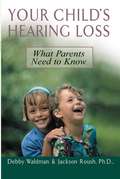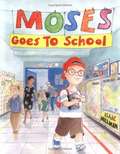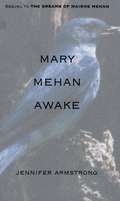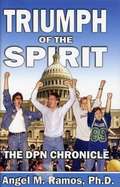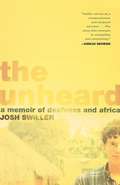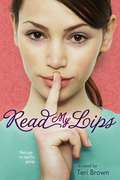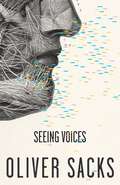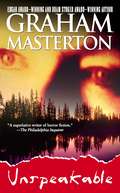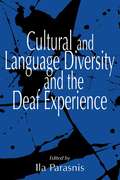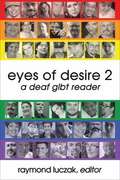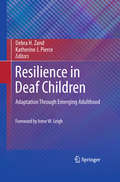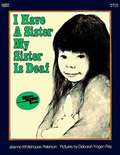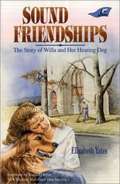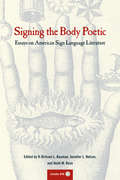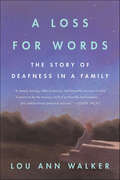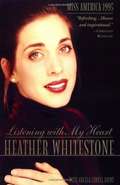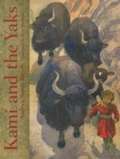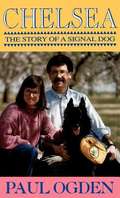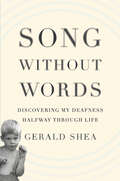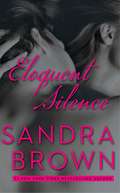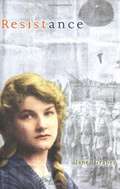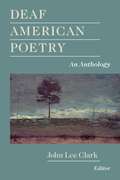Special Collections
Deaf Special Collection
Description: A strong collection featuring biographies, fiction and non-fiction by and about members of the deaf community. For books by and about individuals who are deafblind, visit https://www.bookshare.org/browse/collection/194343 #disability
- Table View
- List View
Your Child's Hearing Loss
by Debby Waldman and Jackson RoushFrom a mother whose daughter has hearing loss, and an audiologist with more than twenty-five years of experience with deaf and hard-of-hearing children and their families, this comprehensive volume offers parents what they need to know from day-to-day practical solutions to technical information to emotional support.
Moses Goes to School
by Isaac MillmanMoses goes to a special school, a public school for the deaf. All his classmates are deaf or hard of hearing, but that doesn't mean they don't have a lot to say to each other! They communicate in American Sign Language, using visual signs and facial expressions. This is called signing. Isaac Millman follows Moses through a school day, telling the story in pictures and written English, and in American Sign Language (ASL), introducing hearing children to the signs for some of the key words and ideas, including a favorite song in sign language. You can sign along! Picture descriptions describe each sign and its movements.
Mary Mehan Awake
by Jennifer ArmstrongIn a compelling sequel to the highly praised "The Dreams of Mairhe Mehan", Mairhe, who has now taken the name Mary, leaves Washington, D.C., to take a position as a domestic servant in upstate New York. The Civil War has ended. Mary's brother, Mike, has been killed at Gettysburg, her father has returned home to Ireland, and, after two years of nursing wounded and dying soldiers in the capital's hospitals, Mary is emotionally exhausted and physically defeated. But in her new life on the shores of Lake Ontario, Mary finds renewal and her senses gradually re-awaken. Each of the novel's five sections focuses on a different sense -- as Mary learns to assist explorer and naturalist Jasper Dorsett in photographing birds, she begins to see things with a photographer's eye; as she falls in love with Dorsett's stable hand, a veteran left deaf by the war, she learns to describe the sounds she hears for him; and so forth, through the renewal of smell, taste, and touch. This challenging and poetic young adult novel concludes Mary's story with a mixture of sparkling language, thematic richness, and emotional depth.
Triumph of the Spirit
by Angel M. RamosIn 1988 the world's only deaf liberal arts university, Gallaudet University in Washington, D.C. was ready for its next president. The Board of Trustees chose a hearing president who knew nothing about deafness. Unrest had been building on campus over this possibility, especially as there were highly qualified Deaf applicants. When the hearing person was selected and announced, the students exploded in protest. The next 7 days were covered by the national and international news media. What happened at Gallaudet had enormous worldwide impact. Since that protest, Deaf people have proudly advanced in all occupations. The DPN Movement has been likened to a civil rights movement for Deaf people. The author, Angel Ramos, PhD., was directly involved in the protest. Note: all spelling errors were in the print text.
The Unheard
by Josh SwillerSwiller spent his early years in frustrated limbo on the sidelines of the hearing world. So he decided to abandon the well-trodden path after college, setting out to find a place so far removed that his deafness would become irrelevant.
Read My Lips
by Teri BrownPopularity is as easy as a good secret. Serena just wants to fly under the radar at her new school. But Serena is deaf, and she can read lips really well-even across the busy cafeteria. So when the popular girls discover her talent, there's no turning back. From skater chick to cookie-cutter prep, Serena's identity has done a 180...almost. She still wants to date Miller, the school rebel, and she's not ready to trade her hoodies for pink tees just yet. But she is rising through the ranks in the school's most exclusive clique. With each new secret she uncovers, Serena feels pressure to find out more. Reading lips has always been her greatest talent, but now Serena just feels like a gigantic snoop...
Seeing Voices
by Oliver SacksSign language is, in the hands of its masters, a most beautiful and expressive language.
Deaf Culture A to Z
by Walter Paul Kelley"A is for American Sign Language. American Sign Language (ASL) is the language of signs used among many Deaf people. Each sign represents a word or words. In the picture on the right, the boy is signing, "What should I do?" The librarian answers, "You can read a book on Deaf Culture." ASL is a beautiful language and it is fun to learn."
Unspeakable
by Graham MastertonThere are no words. . .
Holly Summers is deaf, but she "hears" thanks to her immense talent for lip-reading. A child welfare officer, Holly moonlights for the Portland, Oregon, police, using her unique gift to aid in criminal investigations -- including one into the case of a recent string of women who have vanished without a trace. There is no sound. . .
Witnessing unimaginable evil in the abuse cases she handles, Holly fights every day to salvage broken young lives. But her good works spark plenty of enemies; someone has targeted this avenging angel with a supernatural vow to harm her. And the terror begins when Holly's young daughter disappears. There are no dreams as dark as the horrors some men do. Fending off the shadows of an unearthly predator and the very real threats facing a woman in a man's world, Holly must listen to her deepest instincts for survival -- to save the one person for whom she is living.
Cultural and Language Diversity and the Deaf Experience
by Ila ParasnisThis edited volume provides a comprehensive analysis of deaf people as a culturally and linguistically distinct minority group within American society. Many educators, linguists, and researchers now favor this position, as opposed to that which states that a deaf person simply has an audiological disability. Contributors to this book include members of the deaf community, as well as prominent deaf and hearing educators and researchers. The text contains three sections, covering research on bilingualism and biculturalism, the impact of cultural and language diversity on the deaf experience, and first-hand accounts from deaf community members that highlight the emotional impact of living in the deaf and hearing worlds.
The Deaf Musicians
by Pete Seeger and Paul Dubois JacobsLee is a piano man. Every night, he plays jazz for the crowd. It sounds something like this:
Plink-a-plink-BOMP-plink-plink.
Yimba-timba-TANG-ZANG-ZANG.
One night, Lee's bandmates notice something is off. Lee's music comes out like this:
Ronk. Phip. Tonk.
There's no way to hide it: Lee is losing his hearing. Then Lee discovers sign language. And soon after, he meets Max, who plays the sax. Together they form a new band-the Deaf Musicians. But who will listen to a deaf musician?
With The Deaf Musicians, Pete Seeger, Paul DuBois Jacobs, and three-time Coretta Scott King Honor winner R. Gregory Christie present an inspiring story of overcoming obstacles, set to a jazzy score.
OO-AH, BE-DOOP, BE-DOOP, OO-AH, YEAH!
Winner of the Schneider Family Book Award
Eyes of Desire 2
by Raymond LuczakThis book is an anthology of articles about Deaf gay, lesbian, bisexual, and transgender (GLBT) persons in the United States and elsewhere in the world.
Resilience in Deaf Children
by Katherine J. Pierce and Debra H. ZandHistorically, the diagnosis of deafness in a child has been closely associated with profound disability, including such typical outcomes as unmet potential and a life of isolation. A major shift away from this negative view has led to improved prospects for deaf children.
Resilience in Deaf Children emphasizes not only the capability of deaf individuals to withstand adversity, but also their positive adaptation through interactions with parents, peers, school, and community. In this engaging volume, leading researchers and professionals pay particular attention to such issues as attachment, self-concept, and social competence, which are crucial to the development of all young people. In addition, the volume offers strategies for family members, professionals, and others for promoting the well-being of deaf children and youth.
Coverage includes:
Attachment formation among deaf infants and their primary caregivers.
Deaf parents as sources of positive development and resilience for deaf infants.
Enhancing resilience to mental health disorders in deaf school children.
Strength-based guidelines for improving the developmental environments of deaf children and youth.
Community cultural wealth and deaf adolescents' resilience.
Self-efficacy in the management of anticipated work-family conflict as a resilience factor among young deaf adults.
Resilience in Deaf Children is essential reading for researchers, clinicians, and graduate students in clinical child, school, and developmental psychology as well as for allied researchers and professionals in such disciplines as school counseling, occupational therapy, and social work.
I Have A Sister -- My Sister Is Deaf
by Jeanne Whitehouse PetersonA young deaf child who loves to run and jump and play is affectionately described by her older sister.
Sound Friendships
by Elizabeth YatesFrom the book Jacket: Sound Friendships is the story of Willa Macy, who lost her hearing when she was fourteen years old, and Honey, a golden retriever, who helped her to discover a new world of independence and security. It is also a story about Hearing Dogs-their background, training, special abilities, and the unique relationship they develop with their owners in working to surmount the barriers of a physical handicap.
Signing the Body Poetic
by W. J. T. Mitchell and Jennifer L. Nelson and H-Dirksen L. Bauman and William C. Stokoe and Heidi M. RoseThis unique collection of essays at last brings a dazzling view of the literary, social, and performative aspects of American Sign Language to a wide audience. The book presents the work of a renowned and diverse group of deaf, hard-of-hearing, and hearing scholars who examine original ASL poetry, narrative, and drama. The book showcases the poems and narratives under discussion in their original form, providing access to them for hearing non-signers for the first time. The book provides new insight into the history, culture, and creative achievements of the deaf community while expanding the scope of the visual and performing arts, literary criticism, and comparative literature.
Let's Hear It for the Deaf Man
by Ed McbainWhat with one thing and another, such as a highly successful cat burglar and what seemed to be a hippie crucifixion, the 87th Precinct didn't need The Deaf Man. Especially since he'd already put in two previous appearances resulting in blackmail, murder and general havoc. But they had him, certainly, they very definitely had him -or was it he that had them? This time, The Deaf Man thinks it fitting that a police detective will help him rob a bank.
A Loss for Words
by Lou Ann Walker“A personal journey of introspection by a young woman whose childhood was spent as parent to her deaf parents” (Kirkus Reviews).From the time she was a toddler, Lou Ann Walker acted as the ears and voice for her parents, who lost their hearing at a young age. As soon as she was old enough to speak, she assumed the responsibility of interpreter—confirming doctors’ appointments and managing her parents’ business transactions. While the Walkers’ family was warm and loving, outside the comfort of their home, they faced a world that misunderstood and often rejected them.In this deeply moving memoir, Walker offers us a glimpse of a different world, bringing with it a broader reflection on how parents grow alongside their children and how children learn to navigate the world through the eyes of their parents. In recounting her story, she encourages us to question the inequalities that shape our society, introduces us to the warm, supportive deaf community, and illuminates the creativity and kindness of humanity.Winner of the Christopher Award“A deeply moving, often humorous, and beautiful account of what it means to be the hearing child of profoundly deaf parents . . . I have rarely read anything on the subject more powerful or poignant than this extraordinary personal account by Lou Ann Walker.” — Oliver Sacks
Listening with My Heart
by Angela Elwell Hunt and Heather WhitestoneHeather Whitestone. Her name has become synonymous with incredible determination and unprecedented achievement. In Listening with My Heart, Heather tells her own story and the stories of others who have inspired her, proving that with hard work, perseverance, and faith, each of us can move mountains.
Profoundly deaf since she was eighteen months old, Heather strove to live a normal life, and refused to listen to the voices of discouragement that many of us so often hear, no matter what problems confront us. She wouldn't listen to the doctor who said she wouldn't develop beyond third-grade abilities, or to those who said she would never dance ballet, or even speak. She did, however, hear the encouraging spirit of her family and followed the guidance of her own heart's dreams.
Struggling through her difficulties, she was sustained by every success--no matter how small--and ultimately became Miss America 1995. Though she is disabled, her incredible gifts have inspired many throughout the world, and in Listening with My Heart she at last shares her life-changing wisdom.
Kami and the Yaks
by Andrea Stenn StryerJust before the start of a new trek, a Sherpa family discovers that their yaks are missing. Young Kami, anxious to help his brother and father maintain their livelihood, sets off by himself to find the wandering herd. A spunky deaf child who is unable to speak, Kami attempts to summon the yaks with his shrill whistle. Failing to rout them, he hustles up the steep mountainside to search the yaks' favorite grazing spots. On the way he encounters the rumblings of a fierce storm which quickly becomes more threatening. Surmounting his fear of being alone in the midst of treacherous lightning and hail, Kami uses his heightened sense of observation to finally locate the yaks. Reunited with their animals, the astonished family is once again able to transport their gear and guide the mountain climbers into the majestic terrain.
Winner of the Schneider Family Book Award
Chelsea
by Paul OgdenChelsea: The Story of a Signal Dog is the heartwarming, humorous, inspirational love story of a young deaf couple and the beautiful Belgian sheepdog who acts as their "ears" When Paul and Anne Ogden felt they needed a better link to the hearing world, they turned to Canine Companions for independence, a unique organization that trains dogs to help deaf and disabled persons live more successfully and creatively with their special needs. ...
Once the Ogdens return home with Chelsea, the story unfolds in lively detail. Life in a deaf family with an "almost human" dog seems to be a constant series of adventures and misadventures, and as Chelsea matures into a proud professional, readers will be utterly captivated by her charm. In addition to being a heartfelt animal story, the book shows us life in the deaf world ...
Poignant, touching, and joyful, Chelsea reveals deeper truths about the way we communicate or fail to communicate with one another, while conveying the spirit of triumph that once again proves that dogs are man's (and woman's) best friend. Chelsea is a love story guaranteed to delight.
Paul W. Ogden, professor of deaf education at California State University at Fresno, is the coauthor of The Silent Garden: Understanding the Hearing-Impaired Child. He lives with his wife, Anne Keegan Ogden, R.N., and their signal dog, Chelsea. When Paul is not teaching, writing, or beachcombing, he is collecting stories from deaf people for an anthology.
Song Without Words
by Gerald SheaMuch has been written about the profoundly deaf, but the lives of the nearly 30 million partially deaf people in the United States today remain hidden. Song without Words tells the astonishing story of a man who, at the age of thirty-four, discovered that he had been deaf since childhood, yet somehow managed to navigate his way through Andover, Yale, and Columbia Law School, and to establish a prestigious international legal career.
Gerald Shea's witty and candid memoir of how he compensated for his deafness--through sheer determination and an amazing ability to translate the melody of vowels. His experience gives fascinating new insight into the nature and significance of language, the meaning of deafness, the fierce controversy between advocates of signing and of oral education, and the longing for full communication that unites us all.
Eloquent Silence
by Sandra BrownLauri is a dedicated young teacher for the deaf. Her past conceals a wound still unhealed, her present is a facade, and she uses her career to hide her loneliness. Drake, daytime TV's most popular star, has two secrets -- the daughter he believes may never have a normal life and the dead wife he can't forget. Jennifer is the beautiful hearing-impaired child who may become a pawn between the man and the woman she needs most. Now, in a chic New Mexico arts community, the three are given a chance to be a family...but first each must find a voice to express the deepest fears and greatest needs of the heart.
Resistance
by Janet GraberIt is 1942, and German troops have invaded France. Marianne's mother has joined the Resistance, and Marianne disapproves. Her father has already been killed in the fighting--must her mother risk their lives as well? When her mother hides a wounded English soldier in the cellar of their woodshed, Marianne is filled with dread. She struggles between the impulse to give up the soldier and save her family, and the desire to help her country fight the occupying army.
Deaf American Poetry
by John Lee Clark“The Deaf poet is no oxymoron,” declares editor John Lee Clark in his introduction to Deaf American Poetry: An Anthology. The 95 poems by 35 Deaf American poets in this volume more than confirm his point. From James Nack’s early metered narrative poem “The Minstrel Boy” to the free association of Kristi Merriweather’s contemporary “It Was His Movin’ Hands Be Tellin’ Me,” these Deaf poets display mastery of all forms prevalent during the past two centuries. Beyond that, E. Lynn Jacobowitz’s “In Memoriam: Stephen Michael Ryan” exemplifies a form unique to Deaf American poets, the transliteration of verse originally created in American Sign Language.
This anthology showcases for the first time the best works of Deaf poets throughout the nation’s history — John R. Burnet, Laura C. Redden, George M. Teegarden, Agatha Tiegel Hanson, Loy E. Golladay, Robert F. Panara, Mervin D. Garretson, Clayton Valli, Willy Conley, Raymond Luczak, Christopher Jon Heuer, Pamela Wright-Meinhardt, and many others. Each of their poems reflects the sensibilities of their times, and the progression of their work marks the changes that deaf Americans have witnessed through the years. In “The Mute’s Lament,” John Carlin mourns the wonderful things that he cannot hear, and looks forward to heaven where “replete with purest joys/My ears shall be unsealed, and I shall hear.” In sharp contrast, Mary Toles Peet, who benefitted from being taught by Deaf teachers, wrote “Thoughts on Music” with an entirely different attitude. She concludes her account of the purported beauty of music with the realization that “the music of my inward ear/Brings joy far more intense.”
Clark tracks these subtle shifts in awareness through telling, brief biographies of each poet. By doing so, he reveals in Deaf American Poetry how “the work of Deaf poets serves as a prism through which Deaf people can know themselves better and through which the rest of the world can see life in a new light.”
